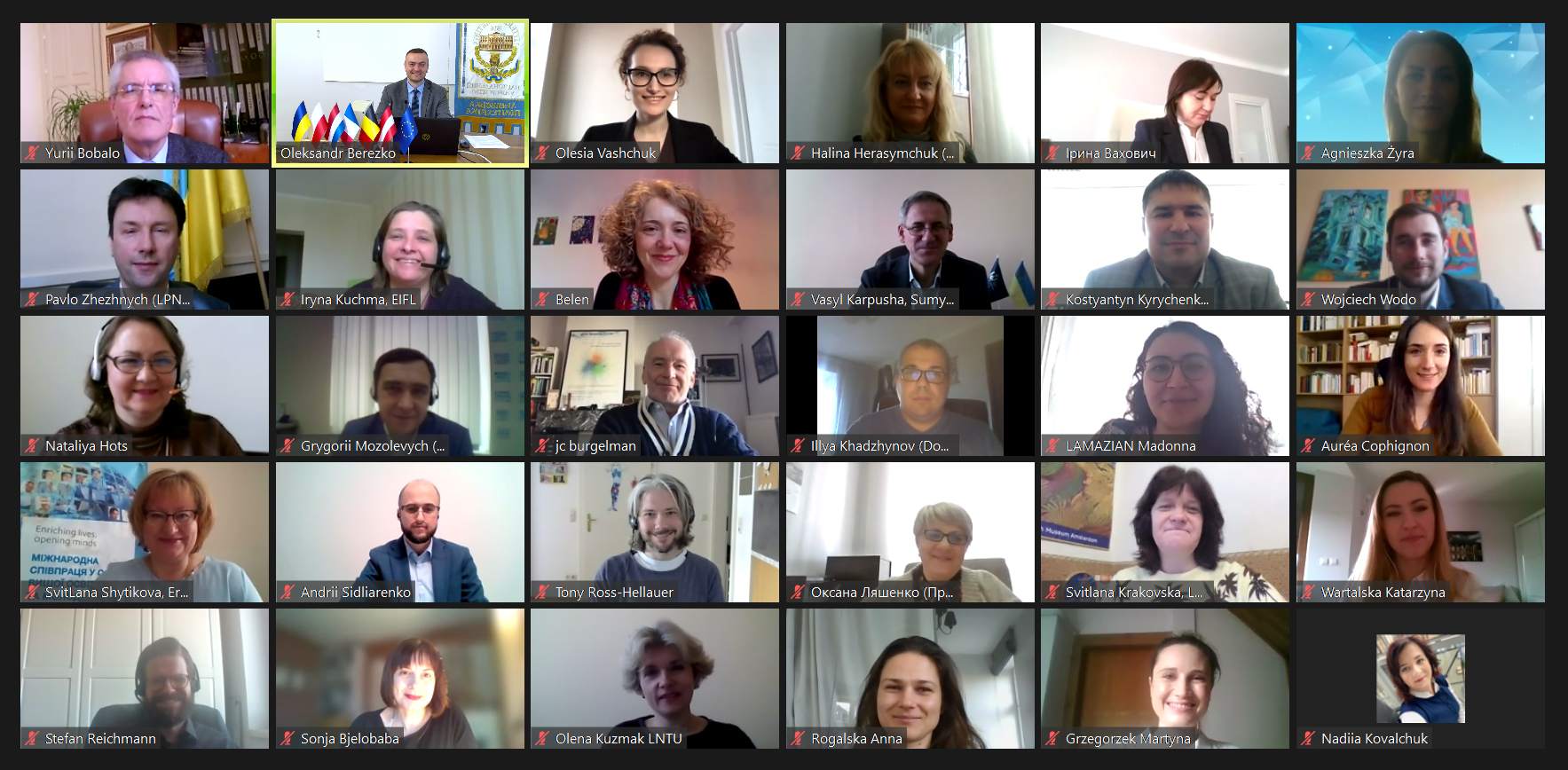On 23 Feb 2021 Lviv Polytechnic hosted an open part of the three-year OPTIMA project as its coordinator. Such events are obligatory for the projects, supported by the Erasmus+ program of the European Union, and serve as their starting points. OPTIMA is aimed at improving the quality of Ukrainian higher educational services by introducing Open Science practices.
Representatives of all OPTIMA project partners participated in the meeting. They were representing: Vasyl Stus Donetsk National University, Sumy State University, Lutsk National Technical University, National Antarctic Scientific Center and the National Agency for Higher Education Quality Assurance, Graz University of Technology (Austria), Wrocław University of Science and Technology (Poland), University of Côte d'Azur (France), the European Council of Doctoral Candidates and Junior Researchers (Eurodoc, Belgium), Stichting eIFL.net (Netherlands), as well as Unicheck Ukraine – associated partner.
Event started with welcome speeches by (records available below):
- Yuriy Bobalo, Rector of Lviv Polytechnic National University
- Jean-Claude Burgelman, Professor of Open Science Policy at the Free University of Brussels and former Head of Unit for Open Science Policy at the European Commission
- Andrii Vitrenko, Deputy Minister of Education and Science of Ukraine
- Belén Enciso, Project Officer, European Commission, Education, Audiovisual and Culture Executive Agency (EACEA)
- Svitlana Shytikova, Head of National Erasmus+ Office in Ukraine
- Olesia Vashchuk, Head of Young Scientists Council at the Ministry of Education and Science of Ukraine
- Pavlo Zhezhnych, Vice-Rector for Education and Informatization of Lviv Polytechnic National University, OPTIMA Project Coordinator
"Our university has a noble history and rich traditions. This foundation helps us to look into the future with confidence being a leader in implementation of innovations. We are consistently moving towards integration into the European higher education and research areas and are open to new trends in academia." – said Prof. Yuriy Bobalo and added, that he would like to host the next project meeting in traditional mode under the roof of Lviv Polytechnic.
"Indeed, we do not have much experience as we are coordinating the capacity building project for the first time. However, we have already managed teams, built and deployed software, developed and released new curricula and organized various international events, so we are already familiar with lots of tasks awaiting us within the project frames. For the rest, we believe that the needed competences are already present among our partners, which are indeed diverse." – stressed Prof. Pavlo Zhezhnych.
After the welcoming speeches, Dr. Oleksandr Berezko, the Project Manager, delivered an OPTIMA project overview:
Prof. Illya Khadzhynov, Vice-Rector at Vasyl' Stus Donetsk National University, described the acute problem of Ukrainian displaced universities:
Dr. Tony Ross-Hellauer, Leader of Open and Reproducible Research Group at Graz University of Technology, presented the concepts of Open Science and Open Peer Review:
Dr. Sonja Bjelobaba, Vice-president of the European Network for Academic Integrity (ENAI), shared best practices on this important topic:
Prof. Nataliia Stukalo, Vice-Head at National Agency for Higher Education Quality Assurance, and Dr. Artem Artiukhov, Assoc. Prof. at Sumy State University, presented Ukrainian vision of academic integrity culture development:
Last, but definitely not least, was the presentation of Dr. Svitlana Krakovska, Senior Researcher at National Antarctic Scientific Center of Ukraine, on the problem of climate change and its mitigation:
After that partners briefly presented their organizations and their roles in the project. All the presentations were recorded and will soon appear on the official project website. Meanwhile, coordinators encourage you to subscribe to OPTIMA social media accounts: Facebook, Twitter, and YouTube.
The next two days of the Kick-off meeting were held in a closed format. The partners discussed important aspects of project implementation, training schedule as well as measures related to overcoming the consequences of the COVID-19 pandemic.
=======
The European Commission's support for the production of this publication does not constitute an endorsement of the contents, which reflect the views only of the authors, and the Commission cannot be held responsible for any use which may be made of the information contained therein.
